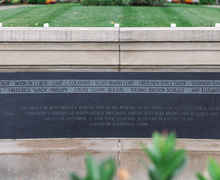Author Dave Zirin speaks on changing perceptions of politics in sports
Richard Perrins | News Editor
Zirin’s discussion Friday brought up the fact that ugliness within the sports world means people are constantly complaining. But those who criticize outspoken athletes are looking at the situation the wrong way, he said.
There’s still one Orange to root for — The Daily Orange! Donate today and help us win College Media Madness.
On the projected screen of Maxwell Auditorium was a photograph of John Carlos, Tommie Smith and Peter Norman on the podium at the 1968 Olympic Games. Carlos and Smith had their gloved fists raised high after placing third and first in the 200-meter race. All three medal winners also wore human rights badges on their jackets.
Two years after the last meeting of the State of Democracy lecture series gathered in Syracuse University’s Maxwell Auditorium, Dave Zirin, a sports and politics writer and author, spoke to a crowd of over 50 people Friday to discuss the intersection of sports and society that the athletes’ protest represented.
The three athletes on the 200-meter podium were part of the Olympic Project for Human Rights, an organization initially founded by Black athletes to boycott the games in protest of discriminatory sports policies across the world, though track and field athletes eventually decided to compete.
Zirin, who co-wrote an autobiography with John Carlos titled The John Carlos Story: The Sports Moment That Changed the World, said that Carlos and Smith decided on the gesture after the boycott fell through, and felt they had to do something to represent the struggle.
“I always thought this was so audacious,” Zirin said. “They gathered all these materials, but they were so confident in what they were doing that they saw the medal stand as something that was just going to happen.”
Rule 50 of the International Olympic Committee now dictates that Olympic athletes cannot make political, religious or racial demonstrations, like that of Carlos and Smith, while in Olympic areas.
“People say that sports and politics shouldn’t mix. But when they say that, a lot of times what they mean is that sports and a certain kind of politics shouldn’t mix,” Zirin said.
Zirin’s discussion Friday brought up the fact that ugliness within the sports world means people are constantly complaining. But those who criticize outspoken athletes are looking at the situation the wrong way, he said.
“We need to start to think about, not rejecting sports, but reclaiming sports,” Zirin said. “We don’t nearly enough take a step backwards and ask ourselves, ‘Why is this space so often soaked with values that I find abhorrent?’”
Zirin pointed to the treatment of Brittney Griner, the WNBA star who was detained in Russia in February, as an example of the values sports needs to move away from. Media coverage would be far more extensive, he said, if a male athlete with similar achievements or notability was in the same situation.
“It’s like they don’t even have a language to speak about her (Griner), the same way they don’t seem to have a language to speak about the WNBA,” he said. “We’re fed such a monochromatic diet in our sports world.”
Despite the issues revolving around sports, Zirin said that every society has had a form of sports and games.
“It’s something that unites us,” Zirin said. “It is a connective tissue across every possible historic era, and every possible national and cultural division — this act of play”
Published on March 27, 2022 at 9:50 pm
Contact Richard: rcperrin@syr.edu | @richardperrins2






